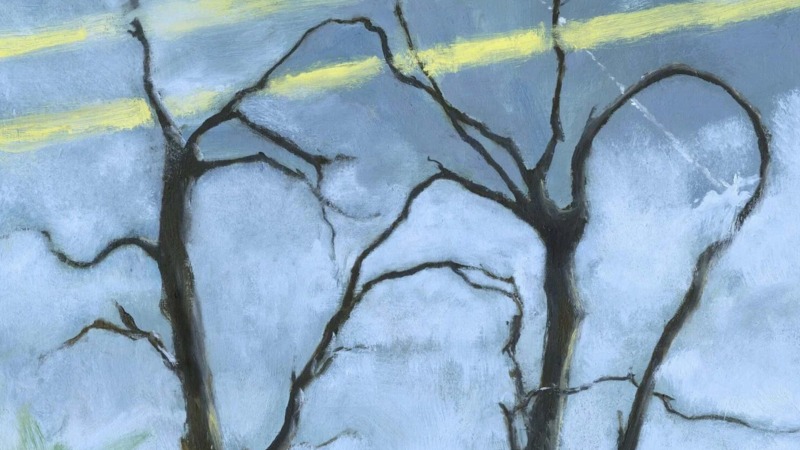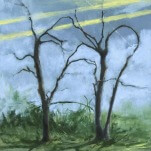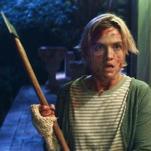Daffo Expels and Escapes on Where the Earth Bends
The Philadelphia musician’s debut album is rampant with little vulnerabilities, thorny distortion, playful self-effacement, and killer rock songs.

Growing up, Gabi Gamberg’s yard was lined with buttery-yellow daffodils. Even now, as the seasons shift and the bounty of springtime subsides, Gamberg’s daffodils are unremitting, living in infamy in the form of their stage name, Daffo. It’s no wonder Gamberg chose a name that signals their youth’s germination—their career charts the trajectory of an artist from their impetus, one willing to parse through the knots of adolescence and search for coherence. The Daffo presented on 2023’s Pest EP had a penchant for killing spiders, but at twenty-one, they look now with more compassion toward the unwanted pests of their earlier music. With indie-rock hits like “Good God” and “Poor Madeline,” Daffo put down roots that flowered into their debut album, Where the Earth Bends—music hot with the spark of juvenalia, reflecting an urge to glorify escapism and expel jumbled up rage until it just makes sense.
Immediately, Daffo’s world is rampant with little vulnerabilities that rise from the soil. “Get a Life” opens on a flower that’s been stepped on, the beginning of a foot trail of squandered opportunities. Gamberg stresses this loss of life, singing, “When you find yourself looking back on all the paths you’ve been, there will be no flower there.” As evidenced by layers of distortion and rousing percussion on many of their tracks, Daffo’s music has an edge, a thorny exterior that sometimes deflects attention from the sincerity of their lyrics. “Get a Life” could easily be the typical mandate imbued with snark, but it beckons its recipient with goodwill, as preceded with, “If you look where you’re going you might get a life full with every bite.” But Daffo hasn’t totally sworn off teenage angst as a songwriting vehicle: the darker ”Habit” takes a snider tone, assigning its target a laundry list of weaknesses to improve upon. Stemming from the deep, distorted guitar that fizzes under Gamberg’s voice, the song wields a pulsing temper—a petulant side of their sound that’s been waiting to show its claws.
“Quick Fix” is the product of retreating to old vices post-writer’s block. Long nights of cigarette smoking and days begun in unfamiliar bedrooms led Gamberg to write “I’m a whore for a quick fix,” a blunt display of self-deprecation. But sonically, the track takes the opposite approach to “Habit,” electing to strip everything down to a humming guitar, low strings, and vocals instead. While it’s common to hear a Daffo song about revenge or the like, their songwriting prowess shines best in their willingness to double down on their own flaws, like in the prickly “When I’m in Hell,” where they abandon moral purity in favor of slumming it with the outcasts. There’s a freedom when Gamberg sings, “I’ve got all these jokes I’ve been dying to tell,” knowing that their quips can be expelled without fear of retribution.
-

-

-

-

-

-

-

-

-

-

-

-

-

-

-

-

-

-

-

-

-

-

-

-

-

-

-

-

-

-

-

-

-

-

-

-

-

-

-

-








































